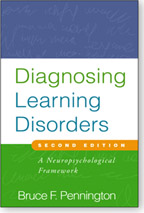 by Bruce F. Pennington
by Bruce F. Pennington
From a trusted expert in the field, this authoritative work provides an accessible overview of what learning disorders are, how they develop, and how to diagnose and treat them effectively.
Full Description:
From a trusted expert in the field, this authoritative work provides an accessible overview of what learning disorders are, how they develop, and how to diagnose and treat them effectively. The author presents the most current neuroscientific knowledge on a range of conditions, including dyslexia, autism spectrum disorders, attention-deficit/hyperactivity disorder, and others. Practitioners gain vital insights and tools for making sense of children's impairments and strengths, collecting and interpreting diagnostic data from a variety of sources, and linking diagnosis to evidence-based interventions. The second edition has now been substantially revised and expanded to reflect significant clinical and research advances.
New to This Edition
- Covers additional disorders: intellectual disability, mathematics disorder, and developmental coordination disorder, plus a chapter on less well-validated disorders.
- New case illustrations and a focus on empirically based practice.
- Now grounded in a multiple cognitive-deficit model of learning disorders, replacing the prior edition's modular, single-deficit model.
- New chapter on controversial therapies separates myths from facts.
"Pennington provides an excellent overview of both theoretical and intervention aspects of learning disorders. This second edition examines learning disorders from a multifaceted view and provides detailed accounts of the assessment and intervention procedures needed to help individuals with these disorders. This book should be required reading for special education and school psychology professionals, as well as graduate students. Pennington should be commended for producing such an authoritative volume."
-R. Malatesha Joshi, PhD, Professor of Literacy Education, ESL, and Educational Psychology, Texas A&M University "In this second edition, Pennington captures the latest research and theories about learning disorders in a way that will be readily understandable for clinicians, scientists, and graduate students educators, and graduate students. He cogently explains how the field has developed, thus providing a broader context for the new research that is covered. Extremely well written, and comprehensive in scope, this volume integrates information from clinical practice, cognitive neuroscience, and molecular biology. It is destined to be the authoritative reference on learning disorders."
-Geraldine Dawson, PhD, Chief Science Officer, Autism Speaks, Inc., and Department of Psychiatry, University of North Carolina, Chapel Hill "Superb. A 'must' for educators, psychologists, and others who care about learning disabilities and want to learn about the very latest scientific knowledge and its implications for clinical practice. Pennington is a trusted expert in learning disabilities, one of only a small cadre of distinguished scholar-clinicians who not only know and create the science, but also work closely with children and adults who are affected. Here, theory and practice are linked in a scientifically rigorous and highly readable and relevant volume."
-Sally E. Shaywitz, MD, Audrey G. Ratner Professor in Learning Development, Yale University School of Medicine; Co-Director, Yale Center for Dyslexia and Creativity; author of Overcoming Dyslexia "This updated work has been eagerly awaited. Pennington provides a basic understanding of the most common learning disorders, complete with the latest genetic and neuroscientific knowledge and clear examples of clinical presentations. In the second edition, the review of unproven therapies is novel and will surely prove useful to clinicians, who are frequently asked by families about these treatments. This book will become a classic for graduate students and practitioners in pediatric neuropsychology, child clinical psychology, and educational psychology."
-Deborah Waber, PhD, Department of Psychiatry, Harvard Medical School, Children's Hospital Boston
356 Pages, Size: 6" x 9"
I. Basic Concepts
1. How Learning Disorders Develop
2. Neuropsychological Constructs
3. Issues in Syndrome Validation
4. Less Well-Validated Learning Disorders
5. Differential Diagnosis
II. Reviews of Disorders
6. Dyslexia, with Robin L. Peterson and Lauren M. McGrath
7. Speech and Language Disorders, with Robin L. Peterson and Lauren M. McGrath
8. Autism Spectrum Disorder, with Lauren M. McGrath and Robin L. Peterson
9. Attention-Deficit/Hyperactivity Disorder, with Lauren M. McGrath and Robin L. Peterson
10. Intellectual Disability, with Lauren M. McGrath and Robin L. Peterson
11. Developmental Coordination Disorder
12. Mathematics Disorder
13. Nonverbal Learning Disability
III. Implications For Practice and Policy
14. Evidence-Based Practice: Barriers and Benefits
15. Controversial Therapies
Appendix A. Helpful Resources for Parents and Teachers
Appendix B. Useful Websites
Appendix C. Frequently Used Tests for Learning Disorders
Stock: Usually ships in 5-8 business days!
|